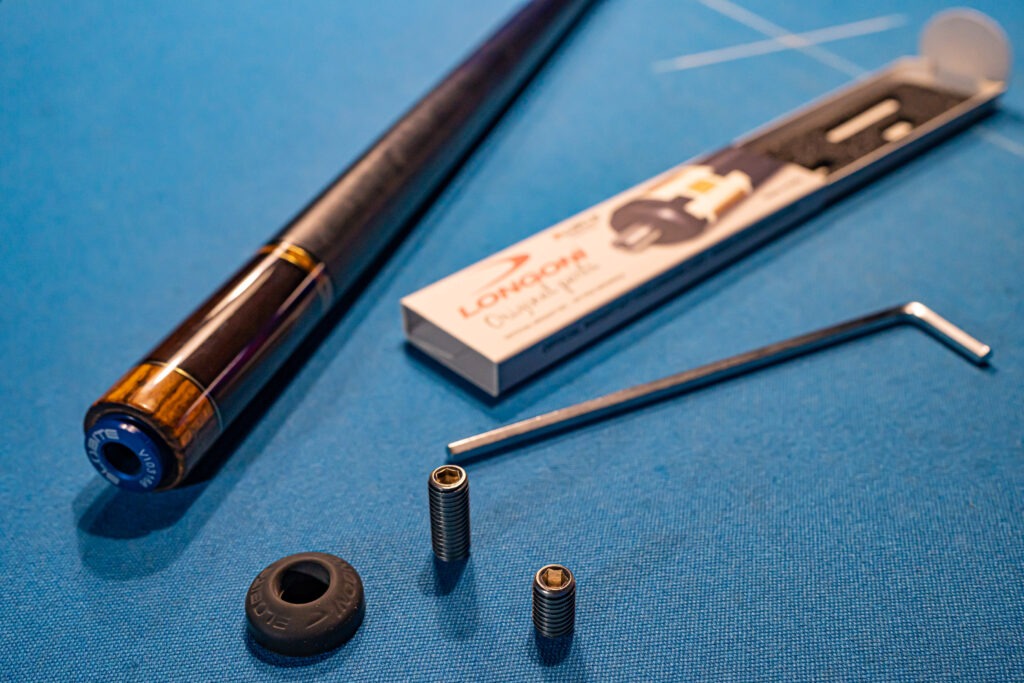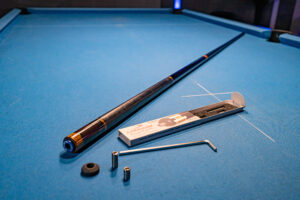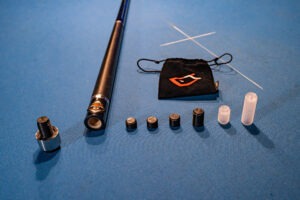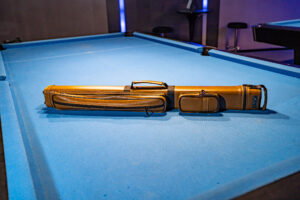
Longoni Nejls Feijen cue with Longoni Billiard Pool Carom Cue Weight Kit
The Crucial Balance:
Understanding the Importance of Pool Cue Balance
In the world of pool, every detail matters. From the alignment of your shot to the spin on the cue ball, precision is key to mastering the game. One often-overlooked aspect that can significantly impact a player’s performance is the balance of the pool cue. Achieving the right balance in your cue can make the difference between a smooth, accurate stroke and a frustrating miss. Let’s delve into the significance of pool cue balance, its advantages, the role of weight, common problems players encounter, and how to address them.
Importance of Pool Cue Balance:
Pool cue balance refers to the distribution of weight along the length of the cue. A properly balanced cue ensures consistency and control in your shots, allowing for more accurate aim, better cue ball control, and improved overall performance. When a cue is well-balanced, it becomes an extension of the player’s arm, providing the necessary feedback and responsiveness needed for precise shots.
Advantages of the Right Cue Balance:
- Improved Accuracy: A balanced cue enables players to hit their intended target with greater precision, leading to more successful shots.
- Enhanced Control: With proper balance, players can exert better control over the cue ball, including spin, speed, and direction, resulting in more strategic gameplay.
- Reduced Fatigue: A well-balanced cue reduces strain on the player’s wrist and arm, allowing for longer practice sessions without sacrificing accuracy or comfort.
Role of Weight in Relation to Cue Balance:
Weight plays a crucial role in achieving optimal balance. While the weight of a cue can vary depending on personal preference, a common guideline is to ensure that the cue is neither too heavy nor too light. The weight should be evenly distributed, with a slight preference towards the front end to facilitate a smooth follow-through.
Common Problems Related to Cue Balance:
- Uneven Stroke: An imbalanced cue can cause inconsistencies in a player’s stroke, leading to missed shots and frustration.
- Lack of Control: A cue that is not properly balanced may result in erratic cue ball behavior, making it challenging to execute precise shots.
- Discomfort and Fatigue: Excessive weight or poor balance can lead to discomfort and fatigue during extended gameplay, affecting both performance and enjoyment.
Common Signals of Improper Cue Balance:
- Vibrations: Excessive vibrations or wobbling during the stroke may indicate an imbalance in the cue.
- Inconsistent Shots: If shots vary in accuracy and control, it could be a sign that the cue balance needs adjustment.
- Physical Discomfort: Discomfort or strain in the wrist, arm, or shoulder while playing may indicate that the cue is not balanced correctly.
At this point you might be having questions in your mind such as: How can pool cue balance be adjusted? Can you change your pool cue balance? Should you add weight to your pool cue to improve balance? Do you need professional assistance for your cue or not?
Adjusting Cue Balance:
- Adding Weight: Players can adjust the balance of their cue by adding weight to either end using weights or inserts designed for this purpose.
- Rebalancing: Some cues come with adjustable weight systems that allow players to fine-tune the balance according to their preference.
- Professional Assistance: If experiencing difficulties in balancing the cue, seeking advice from a professional cue maker or instructor can provide valuable insights and solutions.
Conclusion:
In conclusion, pool cue balance is a fundamental aspect of the game that should not be overlooked. Achieving the right balance not only improves accuracy and control but also enhances the overall playing experience. By understanding the importance of cue balance, recognizing common problems, and knowing how to address them, players can elevate their game and enjoy greater success on the pool table.






